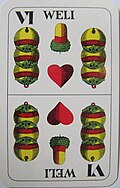 The Weli, the permanent 2nd highest trump | |
| Origin | Germany |
|---|---|
| Alternative names | Zwanzgerln |
| Type | Plain-trick |
| Family | Rams group |
| Players | 4 |
| Cards | 33 |
| Deck | German |
| Rank (high→low) | A K O U 10 9 8 7 |
| Related games | |
| Lampeln • Mulatschak • Ramsen • Schnellen | |
| Features: 5 cards, no exchanging, Weli as special trump, game is 20 points | |
Schnalzen is an Austrian card game for 4 players and a member of the Rams group of games in which the key feature is that players may choose to drop out of the game if they believe their hand is not strong enough to take a minimum number of tricks. It is, broadly speaking, Ramsen with the Weli as the second-highest trump. Players are dealt 5 cards and may not exchange. The Weli is the second-highest trump and game is 20 points.